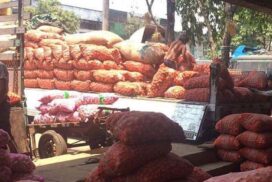As prices of the most of foodstuffs remarkably rose in mid-2023, prices of foodstuffs and foods that general public daily consume were on the rise, according to the consumers.
As breakfast meals such as tea, noodle and Monhinga are also sold at high prices, consumer people miss the chance to control their income and expense on a daily basis.
Tea shops in public residential wards sell K600 to K1,000 per cup of tea, K400 per Indian flat bread and K500 per fried twisted dough sticks. For the time being, noodle or Monhinga shops on the roadside sell K1,000 to K1,200 per cup of meal but advanced shops raise the prices at K1,500 to K1,800 per meal. In the past, consumers could spend K200 in minimum on the meal mixed with steamed glutinous rice and boiled garden pea. But, such a price rises to K500 per meal in minimum now.
Advanced tea shops arrange options for consumers to taste various items of breakfasts as a one-stop service but prices of these meals are equal to the cost for a daily consumption of an ordinary family.
“The land plot for the shop was hired at K1.8 million per month and the agreement was signed for at least three years to five years. We have spent some K20 million on construction of the shop and decorations to attract customers. Moreover, we have to spend K150,000 per waiter. Now, 15 waiters are working there. In addition, we are controlling selling of meals to the consumers at fair prices amid rising prices of basic commodities,” said U Khin Win Kyi, owner of an advanced tea shop in Thingangyun Township told the Global New Light of Myanmar-GNLM.
These advanced shops always calculate various kinds of expenses such as rental charge of shop, labour charges and general taxes as well as hiking prices of commodities.
“Currently, most of the families take a practice of thrift depending on their incomes and expense as much as they can. Advanced shops sell K3,000 per dish of Indian flat bread, K1,200 per cup of tea, K1,800 per cup of Monhinga plus any fritter, K500 per fried twisted dough sticks, K1,000 per parata and K2,000 per Chapatti. So, ordinary low-income people are unreachable for these meals,” said Ko Tun Min, a taxi driver from South Okkalapa Township.
As such, consumption charge of breakfast for the persons from basic strata reaches between K1,000 to K1,500 per daily.
As prices of rice, meat and fish are hiking on a daily basis, roadside food stalls sell K1,500 to K1,700 per meal, up from K1,200.
A dish of meat meal is priced at K2,000, up from K1,500. In the past, egg meal was the most reliable for low-income families but prices of chicken egg hit K250/300 and duck egg K300/350. Water convolvulus rises to K500 per small bundle, up from K100 per small bundle. Likewise, most of the vegetables are also on the rise.
Most of the residents in Yangon city critically face unbalance between income and expense due to rising prices of goods, daily consumption, house rental charge and bus fares.
It can be said that number of consumers at advanced restaurants and beer pubs are really minority, and a few number of people can make a tip for relaxation on the holidays.
Currently, the majority of dwellers of Yangon city are critically trying to overcome daily challenges of hiking prices for basic needs of their families.
Translated.
Hiking prices of majority of foodstuffs unreachable for low-income people
- June 26, 2023
- 210















